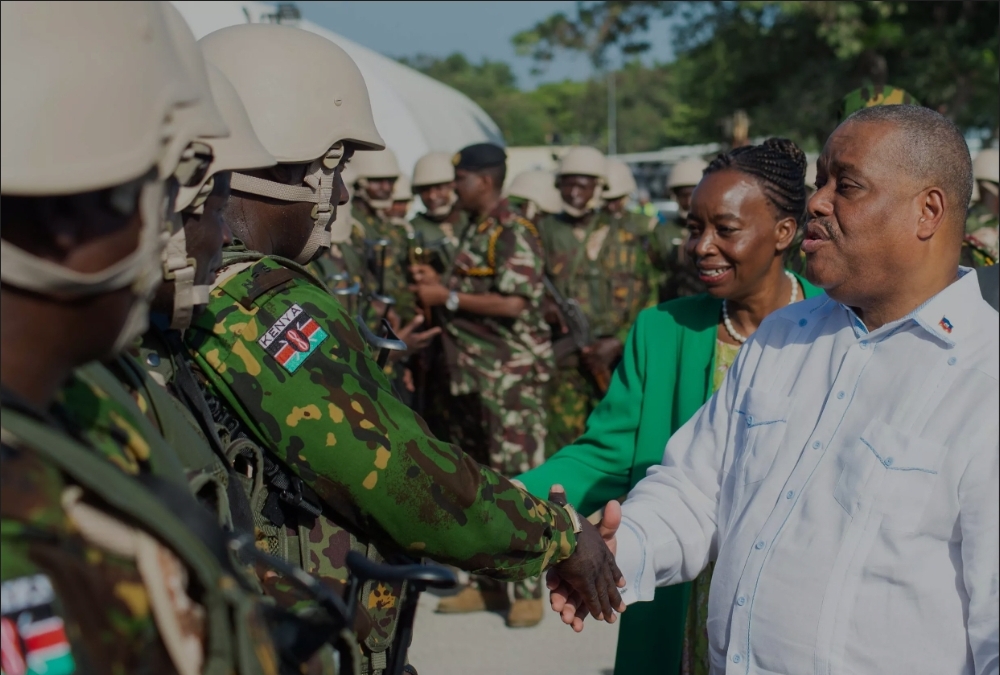
Haiti’s leaders face a high-stakes balancing act as Kenyan forces arrive in the violence-wracked country, where security is desperately needed and the new, unelected government must also win over ordinary Haitians.
The Haitian transitional government and its international backers say the Kenyan policing mission is essential for wresting control from gangs that have seized much of the capital.
At the same time, interim Prime Minister Garry Conille must handle the memories of previous deadly foreign interventions that hang over the nation.
“After (the Kenyans) leave, the same things will happen again,” one Port-au-Prince resident, who declined to share his name, told AFP.
“The real solution won’t come from foreigners. It’s not up to them,” he added, calling on the country’s fractious politicians to “unite to move forward.”
Haiti has long been rocked by gang violence but conditions sharply worsened at the end of February, when armed groups launched coordinated attacks in Port-au-Prince, saying they wanted to overthrow then-prime minister Ariel Henry.
Henry has since handed over power to a transitional council, which named Conille — currently in Washington to meet with US officials — as the country’s prime minister.
His transitional government’s job is monumental: to relieve the political, security and humanitarian crises devastating the poorest country in the Western Hemisphere and to pave the way for the first elections since 2016.
“No official in Haiti has been elected, therefore we are in very uncharted territory,” said Francois Pierre-Louis, a political science professor at New York’s Queens College.
“Everything in Haiti right now is unconstitutional, illegitimate,” he said.
Desperate for security
Renewing the questions on how Kenyan forces will handle the unrest, police fired live rounds at recent protests in Nairobi, leaving at 39 dead, according to monitors.
Haiti itself has a brutal history of foreign interventions, from a 20-year American occupation in the early 1900s to a deadly cholera outbreak linked to a UN peacekeeping mission in the 2010s.
Rules on joining the transitional council, which is supported by regional bloc CARICOM and the United States, included that members couldn’t be opposed to the Kenya-led stabilization mission.
“That set it up from the beginning with the impression that this is yet another foreign-picked government,” said Jake Johnston, a researcher at the Center for Economic and Policy Research in Washington.
A national security council that is supposed to help govern the mission has yet to be set up, and “nobody can actually tell you… who is ultimately responsible, what the oversight of it will be,” Johnston added.
At the same time, many Haitians, desperate for a restoration of order, support the Kenyan force.
“My children can’t go to school anymore,” said Nathalie, 20.
“These children who are growing up don’t have to go through these things.”
Elections unrealistic
While Haiti’s current leaders might be unelected, the lack of government control means that holding a vote would be nearly impossible, experts say.
After an earthquake devastated the country in 2010, the United States, among others, pushed for elections, delayed by the disaster, to be held as soon as possible.
The result was a massively mismanaged, violence-wracked vote widely rejected as illegitimate.
Beyond the immediate need to restore security lie bigger problems of restoring trust — including the issue of links between Haitian politicians and the gangs.
“The government (historically) doesn’t actually do much for most people’s lives, and nobody has faith in the state,” said Johnston. “If that doesn’t change… It’s really hard to see that dynamic changing.”
KOIKI Media bringing the world 🌎 closer to your door step
